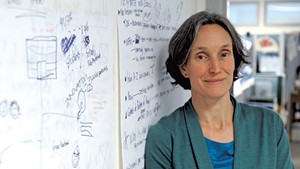
- Secretary of Education Rebecca Holcombe
Rebecca Holcombe, Vermont’s new secretary of education, has an ambitious vision: Close the gaps in learning opportunities. Public education, she says, is “the civil rights issue of our time.”
But Holcombe herself isn’t the product of U.S. public schools. The daughter of United Nations workers, she went to U.S.-government-run international schools in Afghanistan and Pakistan, followed by boarding school just outside Boston.
Holcombe’s interest in public schools came later in life (see “From Afghanistan to the Upper Valley”). After earning degrees from Brown and Harvard universities, she taught at a middle school in Hanover, N.H., and earned a reputation as a visionary young principal in Fairlee, Vt. (see “Consolidation Across State Lines”).
In January, Holcombe, a 47-year-old Norwich resident and mother of two public school students, will leave her job as director of the Teacher Education Program at Dartmouth College to replace outgoing Secretary Armando Vilaseca.
Holcombe inherits a school system in which declining enrollments, shrinking financial resources and a rapidly changing global workplace are forcing Vermont parents, educators and officials to rethink their approach to public education. She says her first priority in January will be to meet teachers, administrators and agency staff, then sit down, listen and learn from them.
While she declined to address recent controversies such as Chittenden County’s effort to adopt a year-round school calendar, Holcombe gave Seven Days a glimpse into her vision for education in Vermont.
SEVEN DAYS: What was it like growing up with such an international background?
Rebecca Holcombe: The power of living abroad is you have to look at yourself from the outside. When you’re in one of those international schools, you’re going to school with children from so many different countries. That challenges you to think about things you take for granted. You realize quickly how important language facility is to doing well. It’s an incredibly privileged way to grow up.
SD: What were some of your biggest frustrations as a teacher?
RH: Any time you’re doing anything in a democratic institution, part of it is dealing with conflict. That doesn’t bother me. But this work is really hard, and it’s really hard to teach well. I wish people understood how complex teaching is, because it’s easy to judge from the outside and say, “You should be doing better.” What sometimes is hard — in the context of high-stakes accountability where you’re giving students these tests and constantly getting feedback — is if you don’t measure up, there are punitive consequences. We’ve got to stop talking about test scores and start talking about the act of teaching.
SD: How do we do that?
RH: We need to move beyond this national narrative of school failure, which I don’t think is accurate. We’ve got to be comfortable talking openly about what we’re doing, the same way we’d expect from our doctors. If they made a mistake, we want them to sit down and diagnose it so it doesn’t happen again. We need to be able to do the same thing in our schools.
SD: Why is the narrative of school failure inaccurate?
RH: The reality is, schools are actually doing better now than they’ve ever done. Vermont has some of the highest graduation rates in the country. Our graduation rates are much higher than they were 50 years ago. We have kids going to college who wouldn’t have gone years ago. We have kids going to school who wouldn’t have gone to school years ago. Our test scores have been rising. The federal government just published a report that placed [Vermont] seventh in the world for math and science. So we need to have a more sophisticated conversation about what it means to do well.
SD: How does poverty make the work of schools more difficult?
RH: The real challenge is that we have growing child poverty. We know that child poverty is associated with higher levels of special-education services, because if you’re not getting adequate nutrition in utero, you’re going to have problems later on in life. Poverty causes stress, and stress suppresses working memory. That impairs school performance. So it’s not that our schools aren’t doing well. It’s that we have these changing social dynamics, which are going to make it more difficult for children to learn.
SD: Should universal preschool be a mandate?
RH: It should be an opportunity. Though this is still in the early stages, we need to find ways to work with the people and agencies that are already providing early education services to come up with clear criteria for high-quality preschool and find the resources to support them. We don’t have the specifics for how that will work yet, but it has to be a high priority.
SD: Should Vermont extend its school day and/or school year?
RH: We know from good empirical research in other areas that the opportunity gaps and achievement gaps we’re seeing aren’t happening during the school day or school year. They’re happening in out-of-school time. You go into any high-income community, those kids are busy all summer. You go into a low-income community, many of them are sitting at home because their parents can’t afford camp. That is the achievement gap. It doesn’t matter how hard they work during the year. We know those low-income kids lose ground over the summer because they’re not engaged, they’re not stimulated.
Meanwhile, their peers are charging ahead. High-income kids actually gain over the summer, because they’re reading, they’re supported, like science camps or LEGO robotics. All those enrichment programs not only build and maintain their academic skills, they give you a sense of purpose.
SD: In your application letter you wrote, “We should not make every child college-ready but innovation-ready.” What did you mean?
RH: I don’t think it makes sense for every child to go to a traditional four-year college. What we need is to make sure every child has a choice and has the skills and understanding to be successful in their career, because careers are not what they used to be.
SD: Is too much emphasis placed on attending college as a prerequisite for success?
RH: [In the future], anything that can be done by computers will be done by a computer. When you go to the drugstore, you check out with a machine. When you fly, you get your ticket at a kiosk. These jobs are going to be gone for students, so we can’t educate them for those terminal jobs anymore. We need to educate them to be “innovation ready” because they need to be constantly reinventing themselves for a very dynamic workforce. They need to be able to handle ill-structured problems and deal with nonstandard situations, because a computer can’t do those things. They need to be able to integrate masses of information that’s meaningful and use judgment, because computers can’t do that, either.
This story first appeared in the December/January issue of Kids VT, Seven Days’ free monthly parenting publication.
The original print version of this article was headlined "Head of the Classes"











Comments
Comments are closed.
From 2014-2020, Seven Days allowed readers to comment on all stories posted on our website. While we've appreciated the suggestions and insights, right now Seven Days is prioritizing our core mission — producing high-quality, responsible local journalism — over moderating online debates between readers.
To criticize, correct or praise our reporting, please send us a letter to the editor or send us a tip. We’ll check it out and report the results.
Online comments may return when we have better tech tools for managing them. Thanks for reading.